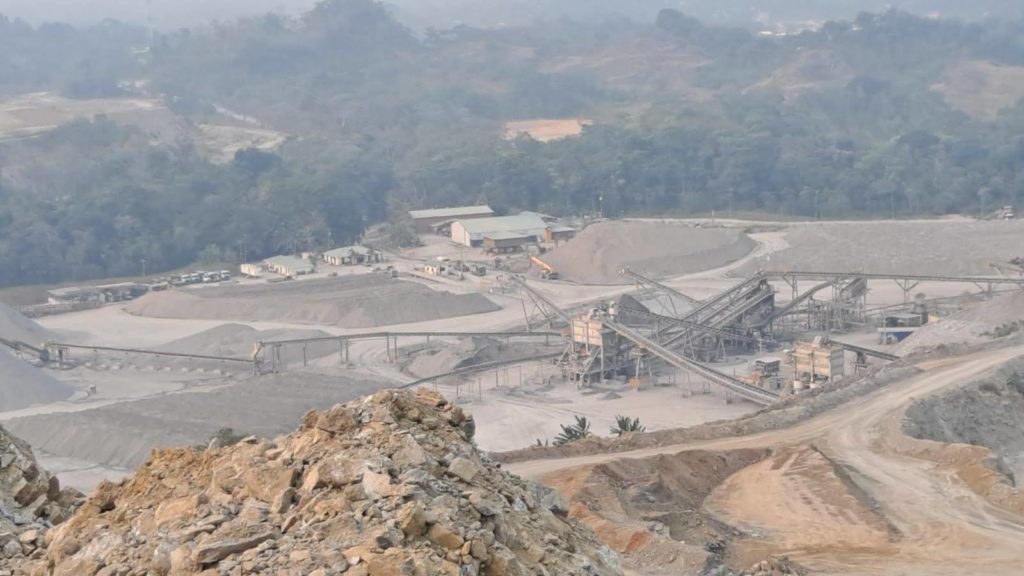Residents of Brisas de Tramade blocked the highway that leads to Puerto Cortés, northern Honduras, demanding that the government shut down an open-pit mine operated by Agregados del Caribe Sociedad Anónima de Capital Variable (Agrecasa) in their community. Protesters say mining has caused irreversible damage to their river. In response to the protest, the Castro administration resorted to police repression.
Text: Allan Bu
Photography: Allan Bu and Nahúm Reyes
Clouds of dust, explosions that shake the ground like an earthquake and cracks on the walls of homes have been frequent occurrences in Brisas de Tramade, a neighborhood in Honduras’ northern Cortés department, for the last 18 years. But the community decided to protest and demand that the government shut down mining operations by Agregados del Caribe Sociedad Anónima de Capital Variable (Agrecasa), a company engaged in non-metal extraction of gravel in open-pit mines.
“One doesn’t know if the ground is trembling or explosives are going off in the mine,” said Jessica, a resident whose house is divided in two by a huge crack. She maintains that 98 percent of homes in the neighborhood have been damaged by mining, although she didn’t say how she arrived at this conclusion.
At 4:30 p.m. on Tuesday, May 7, hundreds of residents of Brisas de Tramade blocked the highway that connects San Pedro Sula and Puerto Cortés, the most important port in Honduras and Central America.
Members of the National Police spoke with community leaders at 10 p.m., but the protest continued.
At 5 a.m. on Wednesday, May 8, protesters and authorities agreed on clearing one lane the following day at 7:30 a.m., but locals say that members of Escuadron Cobra and the National Police arrived one hour earlier than expected and started hitting people, even though there were children present. Windshields of nearby buses and auto-rickshaws were shattered in the clash.
Mirian and her son Francisco say not one of the protesters provoked the sudden repression. “We were unarmed. I thought they were going to kill us,” her neighbor said. A chief of police had told them 1,200 officers were deployed to clear protesters, she and other neighbors said. At the time of the conversation, Francisco’s lips were still swollen because of the police beating.
Some background information on the mining company Agrecasa is important to understand why locals protested and blocked the highway, actions that led to violent repression with tanks and bludgeons by the National Police – an institution that President Xiomara Castro asserted is a community force close to the people that respects human rights.
Agrecasa has been operating in Puerto Cortés for 18 years, locals say, but the company was established on January 22, 2004, according to commercial registry documents, and registered as a mining project with the Honduran Institute of Geology and Mining (INHGEOMIN) in July of 2005. The company extracts gravel from a quarry near the communities of Sapadril Arriba, Sapadril Abajo, La Delicias, Campana y Brisas de Mar Tramade.
According to Honduras’ 2017-2018 EITI Report, Agrecasa is a subsidiary of the U.S. conglomerate American Aggregates, LLC.
The report says Agrecasa exported 2,453,882 metric tons of limestone to the U.S. during the 2017-2018 period. However, the rate of extraction increased over the last year, and truckloads of limestone had been arriving non-stop in Puerto Cortés which is why the numbers from the report have probably increased.
With respect to tax payments during that period, the report says that Agrecasa paid 23,857,809 lempiras ($964,070) to Honduras’ Treasury, but it doesn’t specify if the company paid income tax. In other words, it paid 10 lempiras ($0.40) for every metric ton of limestone exported. The report also revealed that the export of minerals rose to $181.9 million in 2017 and $199.1 million in 2018, when metallic and non-metallic minerals constituted about 4 percent of the country’s exports.
In the aftermath of the conflict over Agrecasa’s operations close to communities, the pros and cons of mining in Puerto Cortés are weighed. On May 9, 2024, a group of truck drivers, contractors for Agrecasa, announced they would block toll barriers in Puerto Cortés, demanding the company temporarily shuts down. But the protest did not take place. Transport workers said Agrecasa employs more than 500 people and is an indirect source of employment for hundreds of small business owners who sell food or provide car maintenance services. The company contributes to earnings amounting to millions of lempiras in the city.
“The presence of said company generates around 100 million lempiras [more than $4 million] in income to Puerto Cortes; there would be an economic deficit in the municipality [if the company leaves], affecting the following businesses: contractors, car maintenance providers, gas stations, stores, real estate, pharmacies, auto parts shops and many more,” a representative of truck drivers told Channel 5.
Moreover, EITI’s report says that 6,300 people were working in quarries by 2018. That number represented 0.15 percent of people employed in the country.
In the process of extracting gravel, the company uses dynamite every two to three days. Explosions pollute the air, cause a deafening sound and damage homes. In addition, the company destroyed a hill, and neighbors say a river, which used to be fast-flowing, is now a small stream.
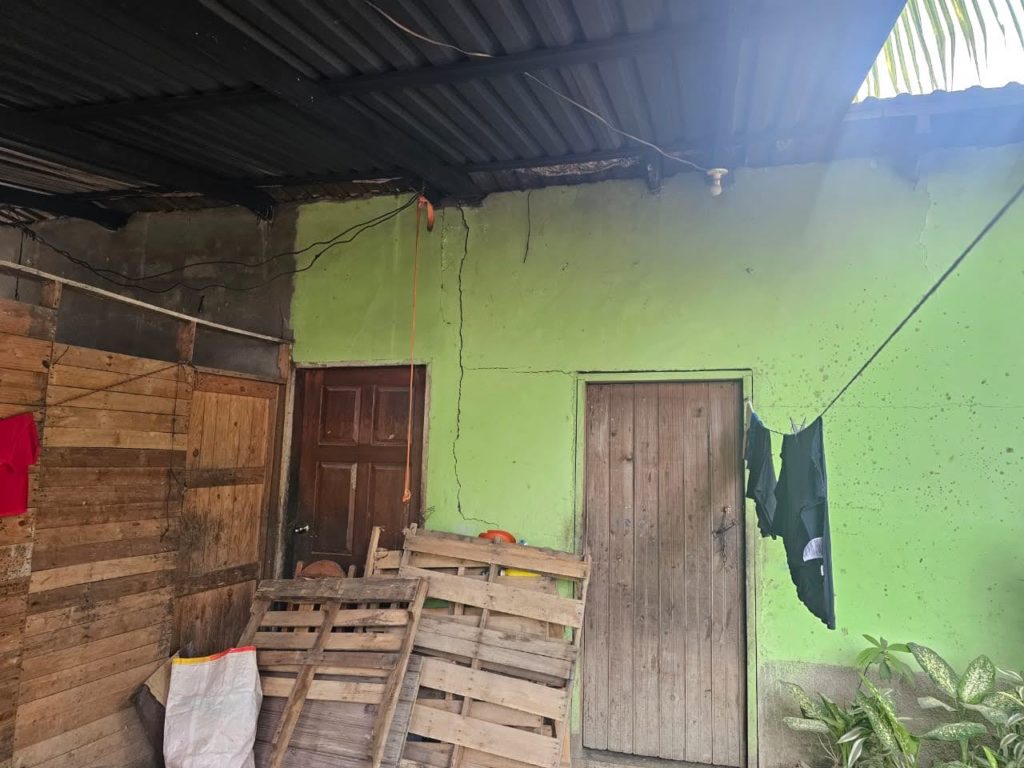
“There is a river where we swam and played around, but water barely flows now. We used to jump into the water; it was beautiful. It used to be nice here, and we didn’t need a fan, but this place has turned into a desert,” said Jessica, whose tone of voice reinforces her message.
Kay Bodden, manager of the Environmental Department at the Municipality of Puerto Cortés, told Contracorriente that the damage to the river is not “documented as an environmental consequence of mining” since water sources in Honduras and the rest of the world have been affected by climate change.
Bodden also highlighted illegal logging in the area: “So, it’s true that there are environmental problems that have reduced the water supply, but it’s not specifically attributable to mining by Agrecasa, although it does contribute to this problem since all mining activities have an impact.” She further explained that water sources are at a higher altitude than the mine, “so every economic activity in the area reduces the water supply.”
Reasons
I spoke to Nahúm Reyes, president of the neighborhood board in Brisas de Tramade, at a gas station in the area. The community has taken security measures after the protest and its outcome. “We have affected powerful interests,” Reyes said. Locals with whom we spoke did not feel comfortable talking about this issue and asked why we were there.
Although the protest ended violently, it resulted in the company temporarily closing the mine. After images of police repression were diffused on media outlets, the Castro administration sent personnel from the Honduran Institute of Geology and Mining (INHGEOMIN) and the Forest Conservation Institute (ICF) to carry out an inspection, which resulted in a suspension of the company’s operations.
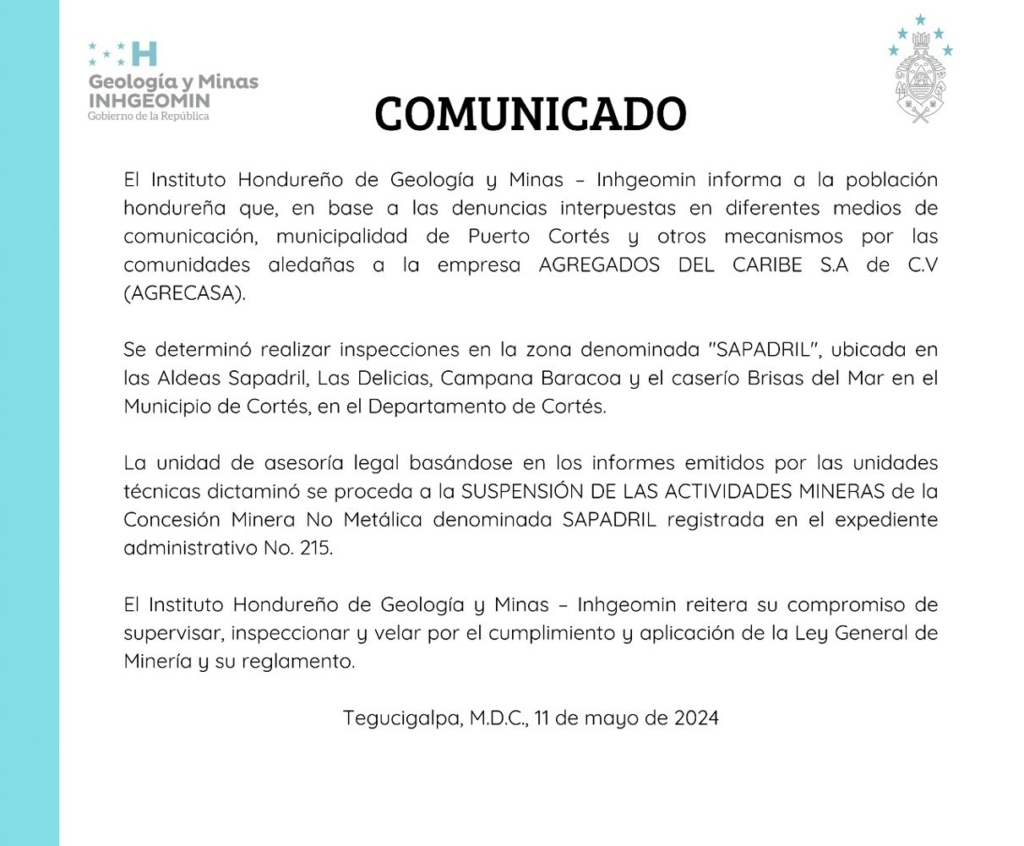
Although INHGEOMIN’s communiqué doesn’t give reasons for the suspension, Reyes says government inspectors found that the company doesn’t comply with industrial safety standards. Furthermore, its environmental license and operating permit had expired, so it had been operating without the proper documentation for four months.
Reyes said they had been requesting information about the mine since 2014. The community wanted to look at agreements reached by representatives of Brisas de Mar Tramade to ensure that they receive benefits from the extraction of minerals. “A compensation fund was supposed to be established a decade ago, but it wasn’t. We requested information in Tegucigalpa [Honduras’ capital] and the municipality during the previous administration, but none was provided,” Reyes said.
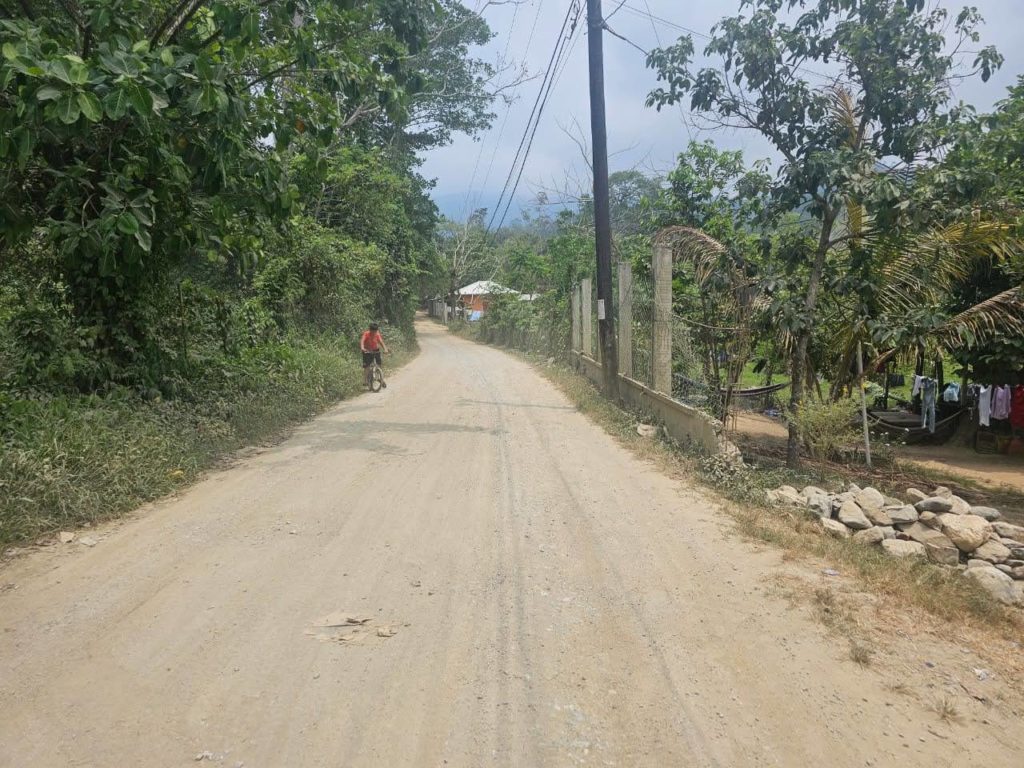
Reyes says it was in the current administration that the Secretariat of Natural Resources and Environment (SERNA) provided the information they had been requesting. This is how they found out the operating and environmental permits had expired, and the company’s obligations had not been fulfilled: “A sports center, bridges and schools were not built, and teachers were not hired. We found out about the compensation fund 18 years later,” Reyes said.
Bodden says she doesn’t have the authority to issue operating permits, but she knows the mining company had a municipal permit by the time INHGEOMIN suspended its activities, actions taken to ensure the mine is in compliance with standards. With respect to complaints about unfulfilled obligations to locals, Bodden said, “that is not handled by this department.”
The mining concession that allows the extraction of limestone as part of the Sapadril project was granted indefinitely, according to INHGEOMIN’s website, but that doesn’t exempt the company from renewing environmental licenses and operating permits.
After obtaining all the information concerning permits and agreements, representatives of the community tried to have a dialogue before protesting. Reyes says the community peacefully marched twice to demand a dialogue with authorities. Leaders of communities were summoned for a meeting on four occasions, but the Mayor’s Office did not send any officials. “We [a commission] went to the municipality, but Mayor María Luisa Martell didn’t see us because she was reportedly on a trip,” Reyes said.
But attempts at finding a solution did not stop there. A group from the community participated in a meeting where they brought their demands. “The mayor didn’t say anything; she simply stood up and left, bringing the meeting to a close. This is what motivated communities to block the highway because it’s the only way one’s voice can be heard in this country. It became a commonplace occurrence to affect honest workers and businessmen [by blocking highways] in order to be heard,” said Reyes, who is a politically active member of LIBRE, the ruling party.
Protests and aggression
At 4 p.m. on Tuesday, May 7, neighbors from Brisas de Tramade peacefully blocked the highway that leads to Puerto Cortés. Chiefs of police who were present spoke with community leaders on two occasions, and agreed to clear one lane, gradually reducing congestion as traffic had been stopped for 12 hours.
However, Commissioner Eduardo Rivera Thomas gave orders to clear protesters one hour before the agreed-upon time. At least a dozen of them suffered hematomas. Francisco Zamora was one of the most beaten protesters. He had hematomas all over his body and had trouble speaking because his lips were swollen. He said they didn’t do anything to provoke such aggression.
“We had an agreement with the colonels and the Cobras that we would clear the highway. Who knows why they reacted that way, but they went after me because I’ve been very active and beat me up badly because I didn’t even block the attacks. I’ve never disrespected them,” said Francisco, who is a sturdy man.
“I haven’t eaten anything in three days because my mouth hurts,” added Francisco, who was saved by one of his brothers from a worse beating. “There was too much damage done. The windows of my brother’s bus were broken as well as the windshields and rear-view mirrors of auto-rickshaws. It was a mess,” he said.
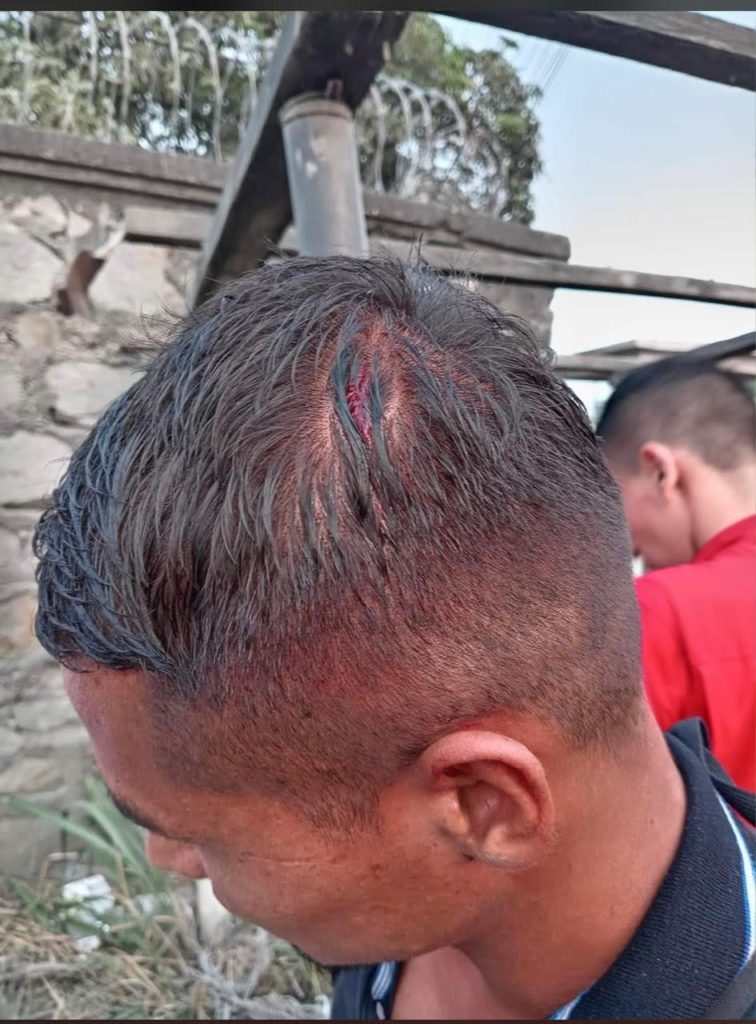
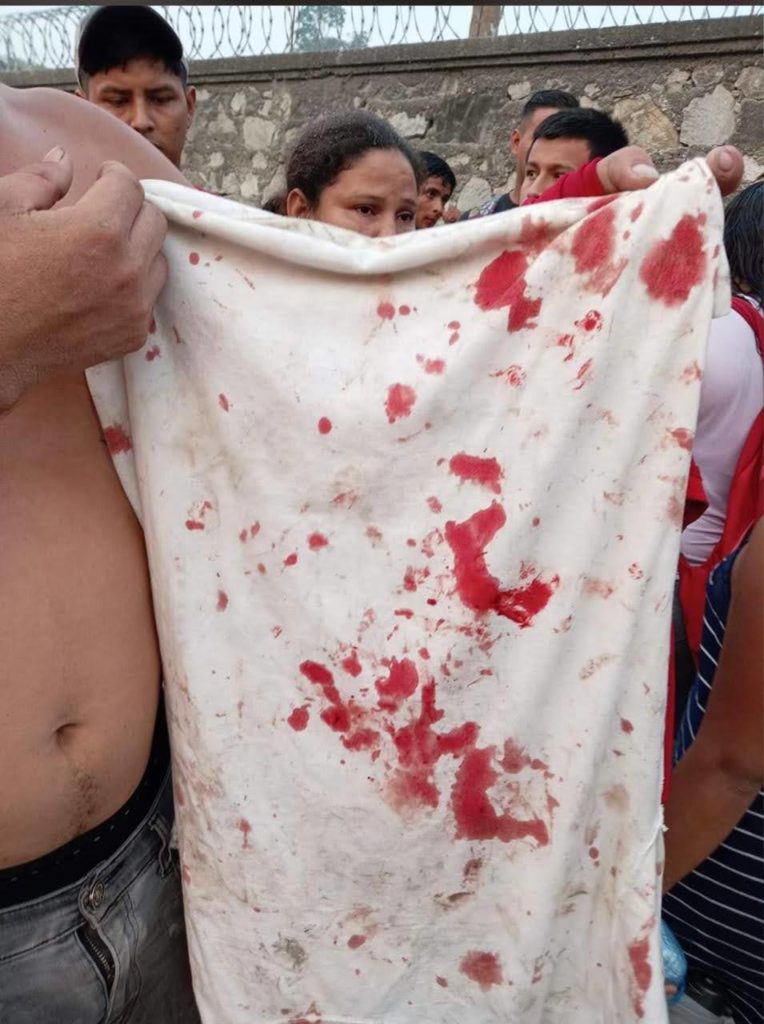
Many people were brutally assaulted by the National Police in a protest against mining in Brisas de Tramade, Puerto Cortés. May 8, 2024. Photo: Nahúm Reyes
Francisco’s brother said that at 4 a.m. on Wednesday, May 8, chiefs of police told them that 1,200 officers were ready to clear the protest, and that they were outnumbered. This is when they agreed to clear one lane. “No one threw anything at them. They started hitting people indiscriminately. They hit a friend of mine who was trying to protect his son; they didn’t show any respect for children,” he said.
Reyes regrets that although the National Police has been willing to enter into dialogue with the population during this administration, it “seemed like a warzone” because of the number of officers sent to repress protesters. “Authorities already have the information. We have irrefutable proof that the order did not come from the president which is why we demand the dismissal of the commissioners of Puerto Cortés and San Pedro Sula,” Reyes said.
Contracorriente contacted Commissioner Eduardo Rivera Thomas, who was identified by locals as one of the police chiefs present in the violent actions to clear the protest. He said only 300 police officers were there. When asked of the police aggression against residents of Brisas de Tramade, who asserted they did nothing to provoke it, he responded: “What happened is that we cleared one of the lanes.” We asked him if there had been an agreement to partially clear the highway, but he gave the same response.
We want them out of here
“What we want the most is that the mine is shut down, but if the company is allowed to stay, we ask that it brings back the mountain and the river; but they won’t be able to, even with all the profits they have made,” Jessica Martínez said sarcastically. She says affected communities should have benefited from the profits that Agrecasa made. We lost our opportunity, she acknowledged.
She regrets losing the river which she considers “the most significant damage mining has caused to the community.” She thinks it’s sad how a million-dollar company – which, according to neighbors, exports more than 60,000 tons of minerals to the U.S. every two to three days – destroys what little poor people have.
“Since Agrecasa makes millions in profits, the poor are worth nothing. And if we go to the streets to protest because we cannot take this any longer, they attack us. I was there; I had to run,” she recalled as she extended her arm to show me a bruise.
Kay Bodden acknowledged that mining always has a negative impact, but such activities are regulated by licenses and concessions. “What one should strive for in terms of environmental protection is to ensure that those impacts are not significant, minimizing damage as much as possible, but mining in any part of the world has an environmental impact,” she said.
With respect to the protests against mining, Bodden says it’s somewhat understandable because mining causes environmental damage. “But one should find out if such activities are legal or not, and as a municipality we are awaiting instructions from national authorities since they handle complaints against mining,” she added.
Honduras’ Mining Law (Ley General de Minería), Article 27, stipulates that exploration, exploitation and extraction should be conducted in accordance with international standards – established by agreements and international treaties ratified by Honduras concerning environmental protection and conservation – as to not compromise public health and safety, applying the precautionary principle where there are threats of serious or irreversible damage.
Neighbors from Brisas de Tramade remember President Castro’s announcement from March 2022, when she declared Honduras “free from open-pit mining,” and promised her administration would evaluate current licenses and concessions. “My understanding is that the president meant until permits expire. We want her to keep that promise and to help us,” Jessica said.
Nahúm Reyes asks the government to heed the community’s requests because Puerto Cortés plays a key role in the country’s economy, and a collapse could be catastrophic for the Castro administration. “We don’t want that; we want good citizens to succeed,” he said.
He mentioned a well-known historical reference about the alleged benefits of mining: “This country is still under colonialism, whereby gold is traded for mirrors. They want to continue operating the mine by force. Employees complain that they will lose their jobs, but they don’t know that in the long run we will have no oxygen, no water, nothing.”
Currency conversions from lempiras (Honduras’ currency) to U.S. dollars are close estimates based on exchange rates from May 2024.

